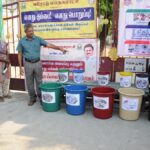
Representational image. File
| Photo Credit: M. Govarthan
The Tamil Nadu government has empowered the village panchayats to issue notices for temporary disconnection of water supply or impose a fine as a deterrent measure to households in the panchayats that do not segregate their solid waste continuously.
Households that do not comply in waste segregation and fail to segregate waste properly before handing it over, would be issued a warning notice under Section 111, 245 (1) and (2) read with Schedule II and II of the Tamil Nadu Panchayats Act, 1994.
If the non-compliance continued, the panchayat concerned is empowered to issue a notice for temporary disconnection of the household’s water supply connection or impose a fine as a deterred measure. These enforcement actions are authorised to be carried out by the respective Zonal Deputy Block Development Officers (BDOs) and village panchayat secretaries.
Same procedures in primary and secondary collection of solid waste have to be followed in peri-urban village panchayats too. The State government issued guidelines for solid waste management and sanitation activities in peri-urban panchayats and village panchayats recently.
Households are to segregate the waste into wet waste (in a green bin) and dry waste (in a blue bin). Wet waste will include kitchen waste, vegetable, fruit waste, garden waste, among others, while dry waste will include plastic covers, tin bottles, pet bottles, metals, glasses, furniture, electric wires, e-waste, among others.
The guidelines also specified the duties of thooimai kavalars in solid waste management in all village panchayats, which are classified into primary collection, secondary collection and disposal. For peri-urban panchayats and large panchayats (with >10,000 population), the wet waste was to be collected along with dry waste, where wet waste in house composting was not possible.
One thooimai kavalar for every 150 households should generally be assigned in all village panchayats and each of them must collect waste from at least 75 households a day, the guidelines said.
The Tamil Nadu government has also issued guidelines for maintenance of drinking water supply and streetlights in rural areas. Every Wednesday, on-site inspections were to be undertaken by village panchayat secretary / makkal nala paniyalar / Zonal Deputy BDO during the night to verify the functioning of streetlights.
As per the guidelines, the drinking water tap, if made in brass, is to be replaced once in two years, replaced in one year if made of plastic and replaced in two years if made of iron, based on the field inspection and as per necessity. It also recommended replacing Sintex (HDPE) tanks once every 10 years.
Published – October 26, 2025 03:26 pm IST

